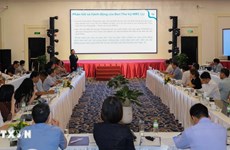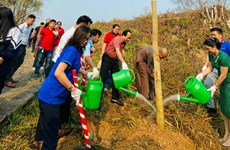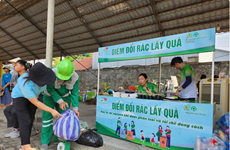Funds committed to conserve biodiversity
The Critical Ecosystem Partnership Fund
in Indochina has granted over 2 million USD to 14 civil society
organisations to conserve biodiversity in the region over the last year.
The Critical Ecosystem Partnership Fund
in Indochina has granted over 2 million USD to 14 civil society
organisations to conserve biodiversity in the region over the last year.
To date, 19 grants have been approved, with eight grants given to projects in Cambodia, five in Vietnam, one in Laos, one in Thailand and four to cross-border projects.
“The fund has laid down a strong funding foundation over the last year in Indochina ,” said Jack Tordoff, the fund’s grant director. “We are particularly excited to see the large number of national applicants, showing developing interest in biodiversity conservation and increased capacity by local groups in the region.”
The fund began a 9.5 million USD five-year investment plan in Indochina in July 2008, with BirdLife International acting as its Regional Implementation Team. Guided by an ecosystem profile, the fund investment strategy focuses on the Northern Highlands Limestone ( Vietnam and southern China ), and Mekong River and Major Tributaries ( Cambodia, Laos and Thailand ) biodiversity conservation corridors.
“Freshwater habitats are particularly threatened in Indochina, so we’re very happy to have already funded local organisations in both Cambodia and Vietnam to research and raise awareness on the value of freshwater biodiversity,” said John Pilgrim, manager of the BirdLife International fund Regional Implementation Team.
“In Cambodia, the 3S River Protection Network was funded to raise awareness among local communities of the possible impact from dams on the Srepok, Sesan and Sekong rivers, and in Vietnam the Centre for Water Resources Conservation and Development (WARECOD) has been funded to build capacity among the local villagers near the Nang River in the northern province of Tuyen Quang, to conduct research into their local aquatic species.”
The fund is a joint initiative of the French Agency of Development, Conservation International, the Global Environment Facility, the Government of Japan, the John D. and Catherine T. MacArthur Foundation, and the World Bank. A fundamental goal of the initiative is to ensure that civil society is engaged in conserving biodiversity./.
To date, 19 grants have been approved, with eight grants given to projects in Cambodia, five in Vietnam, one in Laos, one in Thailand and four to cross-border projects.
“The fund has laid down a strong funding foundation over the last year in Indochina ,” said Jack Tordoff, the fund’s grant director. “We are particularly excited to see the large number of national applicants, showing developing interest in biodiversity conservation and increased capacity by local groups in the region.”
The fund began a 9.5 million USD five-year investment plan in Indochina in July 2008, with BirdLife International acting as its Regional Implementation Team. Guided by an ecosystem profile, the fund investment strategy focuses on the Northern Highlands Limestone ( Vietnam and southern China ), and Mekong River and Major Tributaries ( Cambodia, Laos and Thailand ) biodiversity conservation corridors.
“Freshwater habitats are particularly threatened in Indochina, so we’re very happy to have already funded local organisations in both Cambodia and Vietnam to research and raise awareness on the value of freshwater biodiversity,” said John Pilgrim, manager of the BirdLife International fund Regional Implementation Team.
“In Cambodia, the 3S River Protection Network was funded to raise awareness among local communities of the possible impact from dams on the Srepok, Sesan and Sekong rivers, and in Vietnam the Centre for Water Resources Conservation and Development (WARECOD) has been funded to build capacity among the local villagers near the Nang River in the northern province of Tuyen Quang, to conduct research into their local aquatic species.”
The fund is a joint initiative of the French Agency of Development, Conservation International, the Global Environment Facility, the Government of Japan, the John D. and Catherine T. MacArthur Foundation, and the World Bank. A fundamental goal of the initiative is to ensure that civil society is engaged in conserving biodiversity./.











